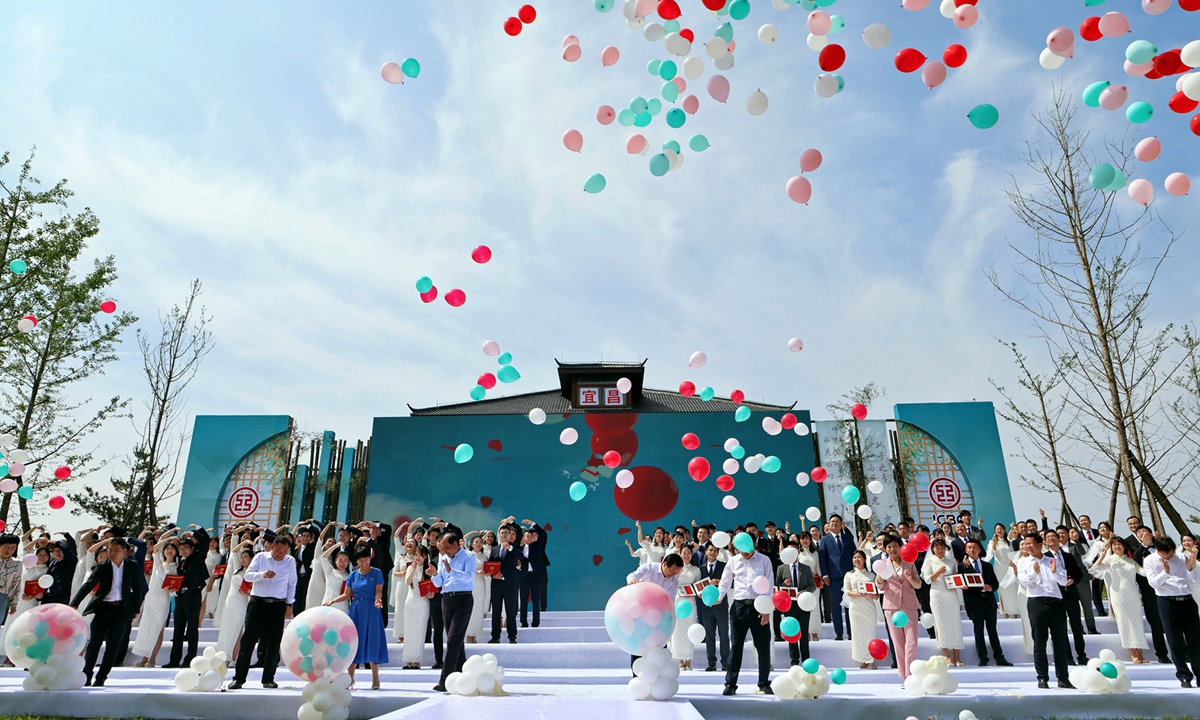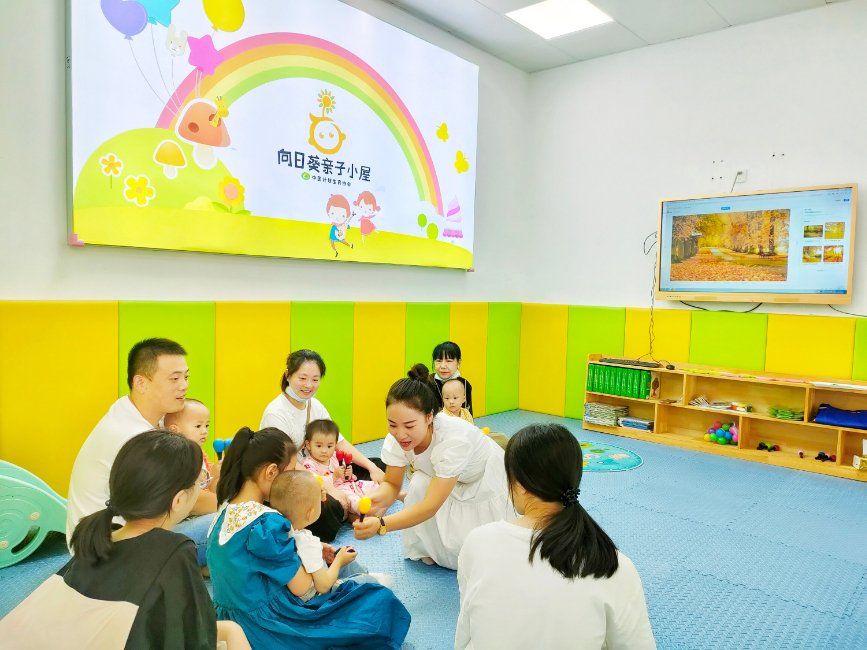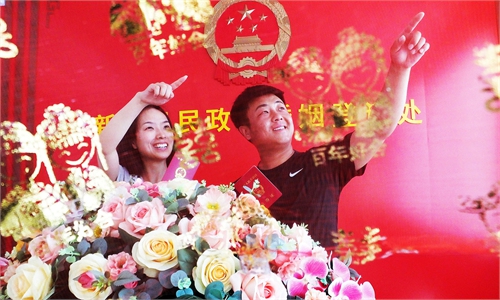IN-DEPTH / IN-DEPTH
China’s ‘new-era marriage and childbearing culture’ highlights lower marriage costs, gender equality
Aspirations for better lives

More than 100 couples hold a group wedding and jointly welcome the "New Era Youth Marriage Declaration," which advocates for a new marriage culture in Yichang, Central China's Hubei Province, on May 20, 2023. Photo: VCG
Wang Qiang (pseudonym) had planned to hold a grand wedding for his 28-year-old son in 2021. Having long been established in the furniture business away from home, Wang, who is in his 50s, wanted to invite as many of his friends and business partners as possible to his hometown, a village in East China's Zhejiang Province, to witness a lavish wedding, which he believed could bring him a sense of pride.There were nearly 500 names on Wang's guest list. Hosting a 40- to 50-table (each table seats 10 people) wedding, which usually cost hundreds of thousands of yuan, used to be common in the village.
"That was too extravagant and unnecessary." Village official He Xiyang and her coworkers decided to persuade Wang to forego the grand wedding feast. After visiting Wang's home twice, he finally agreed to largely shorten his guest list to just 200.
Recently, many cities and provinces across China have intensified their efforts to rein in exorbitant "bride prices" and extravagant wedding ceremonies as part of nationwide efforts to strengthen the development of public cultural-ethical standards in the country's rural areas and create a "new-era" marriage and childbearing culture.
In Chinese culture, families play an indispensable role in providing care for the elderly and children. They offer emotional and economic support, as well as advancing production, community management, and promoting civilization and morality across society.
As China grapples with a low fertility rate, an increasingly aging population, and uneven cross-regional population growth, the concept of a "new-era" marriage and childbearing culture was proposed to meet people's aspirations for better lives with proactive measures to help foster childbearing-friendly environments and contribute to advancing Chinese modernization with support for the high-quality development of the population.
A pilot project was thus rolled out across the country with the aim to promote marriage and childbearing at appropriate ages, improving prenatal and postnatal care services, encouraging couples to share child-rearing responsibilities, and curbing the high costs of betrothal gifts and other outdated marriage customs.
Lower marriage costs

Some newlyweds in Anji county, Huzhou, in East China's Zhejiang Province, are issued with volunteer certificates in curbing outdated, corrupt wedding customs. (Photo: Courtesy of Anji Social Organization Service Center)
The city of Huzhou, where Wang Qiang's hometown - Xiaoyuan village - is located, is just one among 20 cities selected for in the first batch of the pilot project.A village in Huzhou's Anji county, Xiaoyuan has a population of 3,000 inhabitants. Villagers enjoy a decent life thanks to the development of a distinctive local white tea economy, with a per capita net income of nearly 40,000 yuan ($5529.1) in 2019, official data showed.
Nonetheless, high marriage costs were a huge burden to local families in earlier years with costs excluding the expensive wedding venues and the "bride price." The wedding celebration alone would cost as much as 100,000 to 200,000 yuan, village official He Xiyang told the Global Times.
He explained that before the new-era marriage and childbearing culture was introduced, an "extravagant but common" wedding in the village would include a feast for 400-500 guests, brand-name cigarettes and alcohol, wedding venue arrangements and decorations, renting luxury cars, and the hiring of a famous wedding host.
Some families even blew money on inviting a singer of some renown to perform, or renting drones to take photos and videos at the wedding, she added.
The high wedding expense could cost a young man's several years of wages. "Most of the time they had to turn to their parents," she said. "For the less affluent families, borrowing money to fund the wedding festivities was a usual occurrence."
To reduce wedding expenditure especially in rural areas, in September 2022, eight national departments jointly issued a notice to address the problems of excessive "bride prices" and extravagant wedding ceremonies, rolling out a special work plan for a nationwide campaign.
In February, the country unveiled a key policy document or the No. 1 central document for 2023, vowing to launch a special campaign against problems including extravagant wedding ceremonies.
Xiaoyuan village established a working team in 2020, promoting frugal and small-sized wedding, birthday ceremonies, and funerals among local residents. "For a wedding, we suggest that the couple keep the number of guests at around 200," said He.
He said she and her colleagues sometimes go to local hotels (wedding celebration venues) to find out how many tables are booked for an upcoming wedding there, and then estimate the number of invited guests. If the number largely exceeds the recommended guidelines, they then pay a visit to the soon to be married couples and their families, persuading them to downsize the ceremony.
Fortunately, the overwhelming majority of engaged couples are easily persuaded, as downsizing the wedding enables them to reduce the budget by at least tens of thousands of yuan.
"More importantly, today's young people are pragmatic; they don't like to keep up with the Joneses as much as the elder generations do, nor do they think holding a frugal wedding makes them lose face," He noted.
The corrupt custom of high "bride prices" has also faded in Xiaoyuan village with the concept of gender equality gradually taking root in the hearts of local residents, said He.
Gender equality matters
In a traditional and somewhat outdated concept, men usually contribute financially to a marriage, while women contribute time and energy in housework and child-rearing instead.
Chinese demographers reached by the Global Times pointed out that an obvious negative effect of this concept is that many young Chinese people, especially women, are reluctant to get married. Lots of self-proclaimed women who opt out of marriage have said on Chinese social media sites that they fear married life due to the loss of independence and being trapped in household affairs.
The decline in marriage rates is a natural result of social development, said Xu Tianli, head of the Shanghai Marriage Introduction Organization Administration Association.
With more women becoming socially and economically independent, marriage is no longer regarded as a way for women to make a living by relying on their husbands, Xu told the Global Times.
Therefore, the lowering of wedding costs and curbing of objectifying women through "bride prices" being advocated for in China's new-era marriage and childbearing culture, are important steps toward gender equality in marriage, as they signal that men should contribute more in housework and child-rearing, "rather than simply shrinking such responsibility, and giving money to their wives like arrogant bosses," a demographer told the Global Times on condition of anonymity.
It is worth noting that in practice, people should emphasize both the rights and duties of men, the demographer noted. "Cracking down on high 'bride prices' does not mean that men are acquiescing in not taking responsibility for raising children," he added, as new-era marriage and childbearing culture highlights gender equality, and stresses that parents should share in child-rearing responsibilities.
In the latest effort, the China Family Planning Association announced in May the launch of the second pilot project in 20 cities to further build the new-era marriage and childbearing culture.
Ningde in East China's Fujian Province, for instance, was among the latest batch of pilot cities. It recently released a series of posters publicizing the culture. One of the posters, showing the cartoon images of a young couple and three children on it, reads: "Husband and wife jointly share parenting responsibilities."
In Anji county in pilot city Huzhou, volunteers shared with the Global Times a case of in which they convinced a disgruntled wife to give her negligent husband a second chance. The husband in question "neither worked nor looked after the children after an entrepreneurial attempt failed."
The volunteers are from "the magpie bridge guardian league," a nonprofit group under the Anji Social Organization Service Center that was built to help couples deal with marital issues and conflicts. The volunteers educated the husband to take on his family responsibility, and shared with him recruitment information.
"The couple decided to give their marriage another go after the husband reflected on his shortcomings, and promised to better care for the family, and secured a job at a furniture company," the service center's director Ye Wubin told the Global Times.

A volunteer provides premarital counseling services to a couple in Anji county, Huzhou, in East China's Zhejiang Province. Photo: Courtesy of Anji Social Organization Service Center
In the past, women bore the vast majority of child-rearing responsibilities, and many men, especially in some male chauvinism-influenced areas, employed a largely hands-off approach to child-rearing and housework, said Zhou Haiwang, a research fellow and deputy director at the Institute of Urban and Demographic Studies, Shanghai Academy of Social Sciences."It is necessary to further promote the idea of equality between men and women, and call on the two sides to bear parenting responsibilities together," Zhou told the Global Times.
Better child-rearing support
Last week, the All-China Federation of Trade Unions and the National Healthcare Commission said that they have allocated 7.5 million yuan in special funding to support companies in providing childcare assistance for their employees.
Zheng Qiaoxing, a staffer at the Ningde Family Planning Association, told the Global Times that the association's subsequent work mainly focuses on publicizing the new-era marriage and childbearing culture to residents, and provide families in need with better nursery and child-rearing support.
The association has launched a "sunflower parent-child room" project in Ningde. Some 93 parent-child rooms have been built under the project in communities and villages citywide, open to local babies aged zero to three and their parents for free.
The parent-child rooms regularly hold parenting lectures, parent-child activities, and child health check-up.

A "sunflower parent-child room." (Photo: Courtesy of Ningde Family Planning Association)
"It is so convenient for me to learn about infant health from medical personnel at the parent-child room built in my village," young mother Lin Weiwei, a resident of Ningde's Anban Village, told the Global Times. "My daughter also enjoys the music and handwork lessons there," she added.
Many other Chinese cities, such as Shanghai and Zhengzhou in Central China's Henan Province, have also launched similar nonprofit nursery projects to help busy parents take care of their babies, the Global Times reporter learned.
The supportive policies of building a marriage- and childbearing-friendly society are just the very first step, said Zhou. "The decline in fertility is a long-standing global problem, and we have a long way to go."


